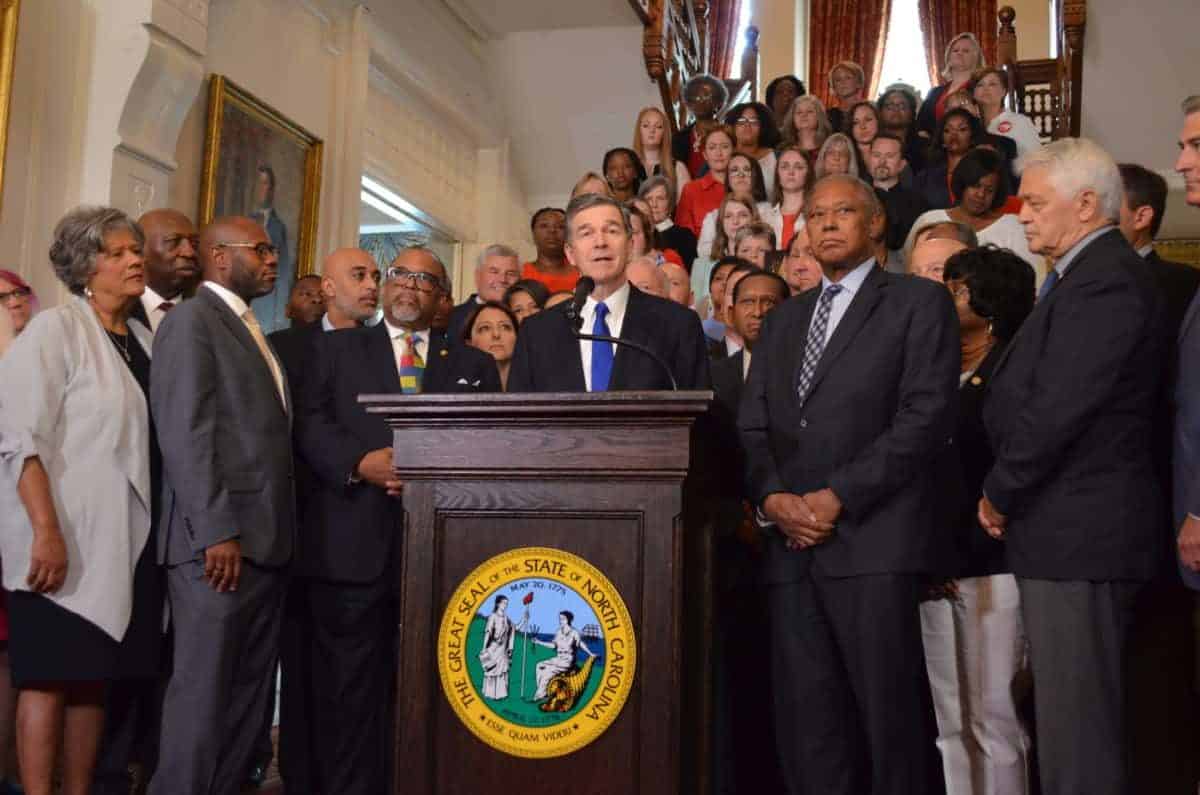

Democratic Gov. Roy Cooper announced today his intention to veto the Republican biennium budget passed yesterday in both the House and the Senate. Despite the fact that some Democrats in the legislature voted for the budget, Cooper said he is confident his veto will be sustained.
“By the measures that matter to me and most North Carolinians, this budget fails,” Cooper said during a press conference at the Governor’s Mansion. “Therefore I must veto it.”
Flanked by legislative Democrats, health care professionals, and educators, Cooper talked at length about Medicaid expansion — the topic legislative Republicans say was the main stumbling block to negotiations. But Cooper said the lack of Medicaid expansion alone isn’t the reason for a veto. He said there were a wide variety of reasons, including Republican lawmakers’ position on education.
Two areas in particular came up in criticism from Cooper: school construction and teacher pay.
The final budget compromise will provide about $4.4 billion over 10 years for K-12 school construction and repair. Of that, $1.5 billion will come from the State Capital and Infrastructure Fund, $1 billion from the Public School Capital Fund, and $1.9 billion in needs-based capital funding. Cooper, on the other hand, favored a school construction bond, something that was initially also favored by the House. Cooper said given low interest rates, a bond is the best plan for school construction.
“Instead of a responsible bond, this budget includes a funding gimmick that is no more than a slush fund, promising projects that may never be built,” he said.
That so-called “slush fund” is the State Capital and Infrastructure Fund. The fund gets 4% of state revenue to take care of the state’s debt and for capital projects for state government and the UNC System. Under the compromise budget, the fund will get an infusion of $300 million and be used more broadly.
Cooper also talked about teacher pay. The compromise budget includes an average 3.9% pay raise over the biennium, but all new raises go to teachers with 16 years of experience or more. Teachers with fewer than 16 years simply get their planned step increases. Cooper’s plan would have included an average 9.1% increase for teachers, as well as the restoration of master’s pay.
“We trust our teachers to educate our children,” he said. “Let’s put our money where our trust is.”
The Democratic leaders of the House and Senate also spoke at Cooper’s press conference.
Sen. Dan Blue, D-Wake, said Democrats and Republicans share many areas of agreement.
“Democrats and Republicans are on the same page in many ways on what needs to be prioritized in the state budget. Economic development, investments in teacher pay and school infrastructure, and improved access to affordable health care,” he said. “We haven’t come to an agreement yet on how to address these critical issues, but I have confidence that we will get there.”
Rep. Darren Jackson, D-Wake, said that the two parties need to cooperate to get a workable budget.
“They’ve got to talk to us. We’ve got to work together,” he said. “We’ve got to do a budget that is good for all of North Carolina, focuses on improvements in health care and public education — not just in Republican districts, not just in a few sole Democratic districts, but in everybody’s district.”
At a press conference shortly after Cooper’s announcement, Senate President Pro Tempore, Phil Berger, R-Rockingham, criticized Cooper’s move, saying that despite what Cooper says, Medicaid expansion was the real reason Cooper is vetoing the budget.
Berger said that Republicans have been asking Cooper for a counteroffer to their legislative proposals for a while now, but Cooper never provided one. He suggested that Cooper always planned to veto the budget.
“We didn’t need to go past this year’s budget deadline, but the governor has made sure that we will,” he said.
House Speaker Tim Moore, R-Cleveland, said the following in a statement sent after Cooper’s press conference:
“Blocking billions of dollars in funding for North Carolina communities less than a day after receiving the budget is a reckless and irresponsible decision by the Governor that must be overridden to deliver critical investments in infrastructure, disaster relief, public safety, pay raises, and school construction, to our state’s citizens,” Moore said.
After the governor formally vetoes the budget, it will return to the House — where the budget originated — for an override vote. If the House overrides, the veto goes to the Senate for an override vote. If the House doesn’t override the veto, then negotiations begin in earnest. The House is off next week. The Senate will be in session Monday and Tuesday, and then they are off the rest of the week.


